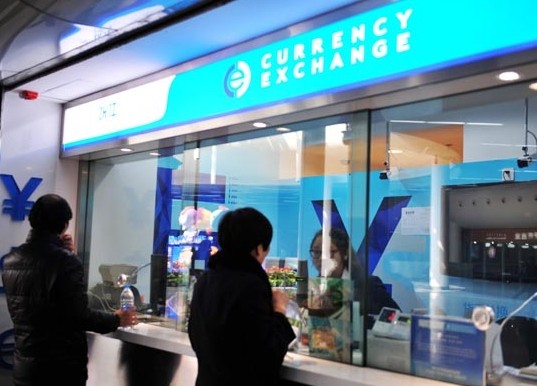

A currency exchange counter at a subway station in Shanghai. The yuan closed at 6.1781 to the dollar on Monday, down 285 basis points from Friday. Provided to China Daily
The yuan eased against the US dollar in the first trading day after China doubled the currency's daily trading band to 2 percent - a move intended to increase volatility and break one-way appreciation.
The yuan closed at 6.1781 to the dollar on Monday, down 285 basis points from Friday.
The currency weakened even though the People's Bank of China set the daily reference rate 25 bps higher at 6.1321.
Economists said that Monday's movement reflects growing market uncertainty about the yuan's direction after a decade of almost unbroken appreciation, which was just what the central bank intended.
Over the weekend, the PBOC widened the yuan's trading band for the third time since 2007. The band was widened to 1 percent from 0.5 percent in April 2012. Before that, it was widened to 0.5 percent from 0.3 percent in May 2007.
The PBOC also said in its announcement that the spread between selling and buying rates offered by foreign exchange-designated banks can't exceed 3 percent of the central parity rate, instead of 2 percent, adding further flexibility to the market.
Between mid-February and the PBOC's move, the yuan slid more than 1.5 percent against the dollar - the result of heavy intervention by the PBOC, which had become concerned about speculators with significant long yuan positions.
Those speculative moves were adding liquidity just as the government was trying to deleverage the economy to pave the way for structural reforms.
"The authorities are trying to increase uncertainty around the yuan outlook," wrote Standard Chartered Plc in a research note.
Liu Ligang, chief China economist with the Australia and New Zealand Banking Group Ltd, wrote in a report that the latest band widening could further weaken the currency in the short term.
But Liu said that the depreciation will be short-lived if there's no fundamental change in the one-way capital inflows, especially when China still has a very sizable current account surplus.
UBS AG said in a report on Monday that the yuan is near equilibrium and the widening won't guide it in a new direction. The bank maintained its forecast that the yuan will hover around 6.1 to the dollar this year.
"We expect two-way fluctuation to intensify after the widening. 'Hot money' inflows will likely wane, and companies and banks will more effectively manage foreign exchange risks, but we don't think that that will directly affect trade and economic growth," said UBS.
Mitul Kotecha, a Hong Kong-based managing director with Credit Agricole CIB, wrote that appreciation pressure on the yuan will return on a likely resumption of capital inflows, and a move back to about 6.00 by end-2014 remains "in the cards".
In the near term, he wrote, it seems unlikely that the authorities will intervene as aggressively to weaken the yuan as they did in recent weeks, with a breach of 6.15 likely to prove short-lived.
Copyright ©1999-2018
Chinanews.com. All rights reserved.
Reproduction in whole or in part without permission is prohibited.